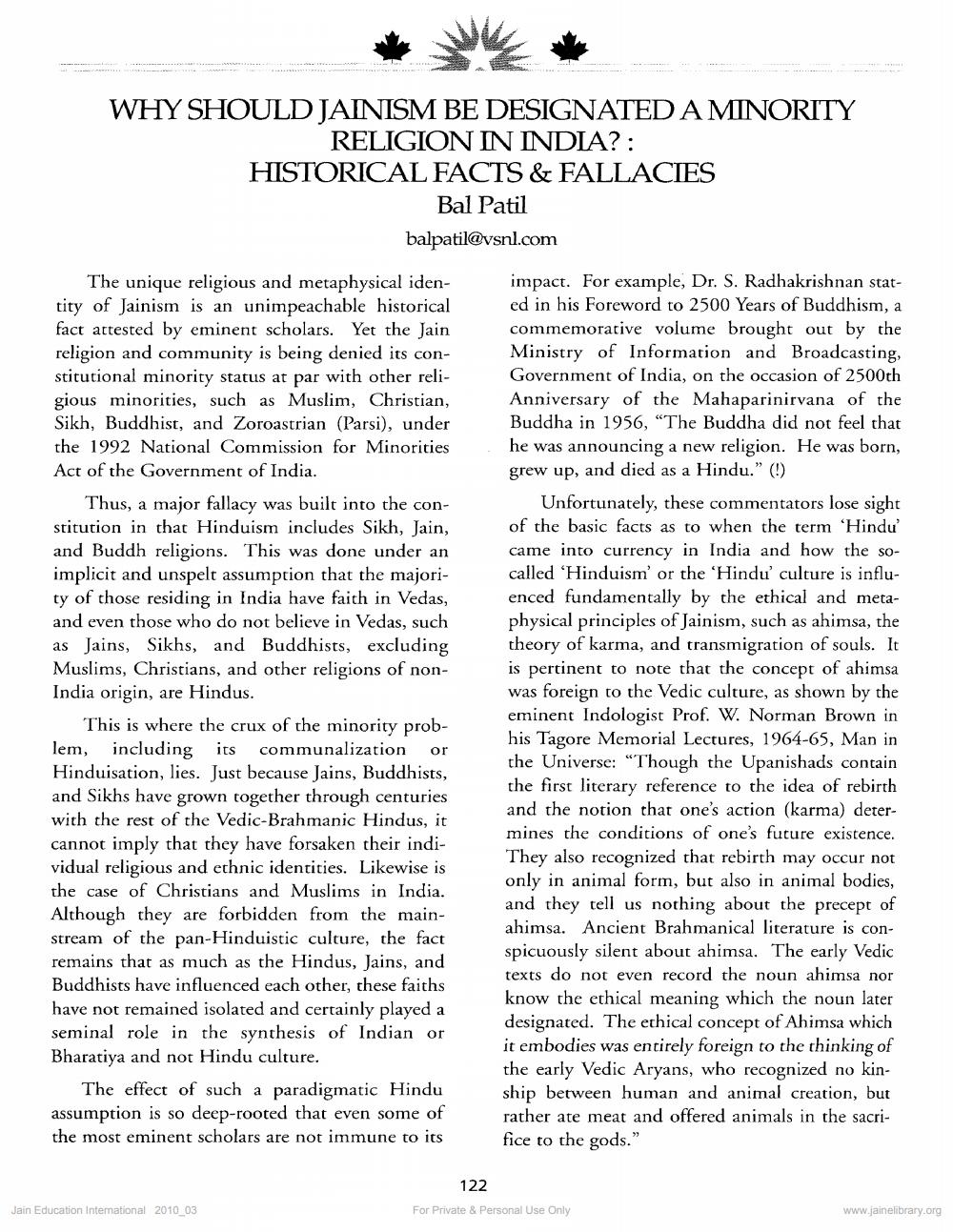________________
WHY SHOULD JAINISM BE DESIGNATED A MINORITY
RELIGION IN INDIA?: HISTORICAL FACTS & FALLACIES
Bal Patil
[email protected]
The unique religious and metaphysical identity of Jainism is an unimpeachable historical fact attested by eminent scholars. Yet the Jain religion and community is being denied its constitutional minority status at par with other religious minorities, such as Muslim, Christian, Sikh, Buddhist, and Zoroastrian (Parsi), under the 1992 National Commission for Minorities Act of the Government of India.
Thus, a major fallacy was built into the constitution in that Hinduism includes Sikh, Jain, and Buddh religions. This was done under an implicit and unspelt assumption that the majority of those residing in India have faith in Vedas, and even those who do not believe in Vedas, such as Jains, Sikhs, and Buddhists, excluding Muslims, Christians, and other religions of nonIndia origin, are Hindus.
This is where the crux of the minority problem, including its communalization or Hinduisation, lies. Just because Jains, Buddhists, and Sikhs have grown together through centuries with the rest of the Vedic-Brahmanic Hindus, it cannot imply that they have forsaken their individual religious and ethnic identities. Likewise is the case of Christians and Muslims in India. Although they are forbidden from the mainstream of the pan-Hinduistic culture, the fact remains that as much as the Hindus, Jains, and Buddhists have influenced each other, these faiths have not remained isolated and certainly played a seminal role in the synthesis of Indian or Bharatiya and not Hindu culture.
The effect of such a paradigmatic Hindu assumption is so deep-rooted that even some of the most eminent scholars are not immune to its
impact. For example, Dr. S. Radhakrishnan stated in his Foreword to 2500 Years of Buddhism, a commemorative volume brought out by the Ministry of Information and Broadcasting, Government of India, on the occasion of 2500th Anniversary of the Mahaparinirvana of the Buddha in 1956, “The Buddha did not feel that he was announcing a new religion. He was born, grew up, and died as a Hindu." (!)
Unfortunately, these commentators lose sight of the basic facts as to when the term 'Hindu' came into currency in India and how the socalled 'Hinduism' or the 'Hindu' culture is influenced fundamentally by the ethical and metaphysical principles of Jainism, such as ahimsa, the theory of karma, and transmigration of souls. It is pertinent to note that the concept of ahimsa was foreign to the Vedic culture, as shown by the eminent Indologist Prof. W. Norman Brown in his Tagore Memorial Lectures, 1964-65, Man in the Universe: “Though the Upanishads contain the first literary reference to the idea of rebirth and the notion that one's action (karma) determines the conditions of one's future existence. They also recognized that rebirth may occur not only in animal form, but also in animal bodies, and they tell us nothing about the precept of ahimsa. Ancient Brahmanical literature is conspicuously silent about ahimsa. The early Vedic texts do not even record the noun ahimsa nor know the ethical meaning which the noun later designated. The ethical concept of Ahimsa which it embodies was entirely foreign to the thinking of the early Vedic Aryans, who recognized no kinship between human and animal creation, but rather ate meat and offered animals in the sacrifice to the gods."
122
Jain Education Interational 2010_03
For Private & Personal Use Only
www.jainelibrary.org
